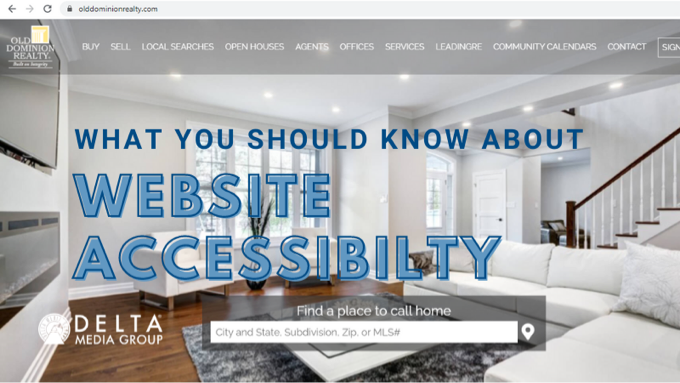You are viewing our site as an Agent, Switch Your View:
Agent | Broker Reset Filters to Default Back to ListWhat You Should Know About Website Accessibility
June 21 2021
 When you create a website for your real estate business, it's crucial to make sure that everyone has equal access to all of the features that your website offers. The Americans with Disabilities Act (ADA) includes standards for website accessibility, and following key guidelines can help ensure your website provides a reliable, equal experience for all visitors. Whether you're creating a new real estate website or updating an existing one, this guide can help you get started with website accessibility.
When you create a website for your real estate business, it's crucial to make sure that everyone has equal access to all of the features that your website offers. The Americans with Disabilities Act (ADA) includes standards for website accessibility, and following key guidelines can help ensure your website provides a reliable, equal experience for all visitors. Whether you're creating a new real estate website or updating an existing one, this guide can help you get started with website accessibility.
Why Website Accessibility Matters to Your Real Estate Business
Your website visitors will come from a wide variety of backgrounds, and some of them will be people with disabilities, which makes it harder to access certain website features. With the integration of accessibility standards throughout your website, visitors with disabilities will be able to consume all of your content and use all of the features that your website has to offer. In addition to simply being the right thing to do, making your website accessible can help avoid lawsuits and liability issues that can arise when a website isn't accessible. Meeting ADA standards helps ensure that your website is up to date with accessibility and provides a robust experience for all users.
Key Elements of Website Accessibility
The ADA provides extensive guidelines on website accessibility, and those guidelines are worth reading in full. Here, we'll provide a look at some of the key standards for website accessibility that are especially relevant for real estate websites.
Adjustable Text Size
The ability to adjust text size is crucial to making sure that users can easily read all of your text-based content. And it's not just the ability to adjust the size of the text that matters. It's also important to ensure that your website still offers all of the same features and functionality, even if the size of the text has been adjusted.
Clear, Consistent Navigation Options
A clear, logical navigation layout is important for all users, and navigation is also part of ADA standards. It's important to provide the same seamless navigation options in the same locations on each page so that users can easily find what they need on your website. It's also a good idea to provide more than one option for navigating your website. This can include a website search function and an HTML sitemap, in addition to your standard navigation menus.
Captions for Video Content
Captions make it easier for people with certain disabilities to enjoy all of the video content that your website has to offer, and you can use software to provide captions even for live video content. For any pre-recorded video or audio content, you should also provide an audio description for the content, along with a link that makes that audio description easy to find.
Avoid Images of Text
It's important to avoid using images of text because the text in images can't be resized with the same consistency as regular text. Some exceptions are made for images that are essential to the website, but few images fall within those exceptions. Rather than use images of text, you can use the same text conventionally, with attribution if necessary.
Error Suggestions for Website Forms
Any website forms, like those used to contact your business or sign up for your newsletter, should have error suggestions to help people fill out the form successfully. Error suggestions can be text-based and should help with basic input errors that often come with filling out things like phone numbers or addresses.
Use Descriptive Headings and Labels for Content
Using descriptive headings and labels for content helps all users, including those with disabilities, understand the purpose of content and navigate through that content more easily. Try to make headings as simple and descriptive as possible. Also, make sure you label all elements of your website, like contact or sign-up forms.
How to Help Your Website Stay Compliant
Worried about accessibility with your real estate website? Let our experienced team at Delta Media Group help you handle all of the key details. We strive to make every website we build as accessible as possible by providing adjustable fonts, detailed image descriptions for screen readers, forms that are not time-sensitive, testing every website with the WAVE suite of tools that helps evaluate website accessibility, and taking additional steps to ensure accessibility throughout your website. We stay up to date on the latest accessibility standards, and we make sure that your website does, too. Contact us today to learn more.
To view the original article, visit the Delta Media Group blog.









